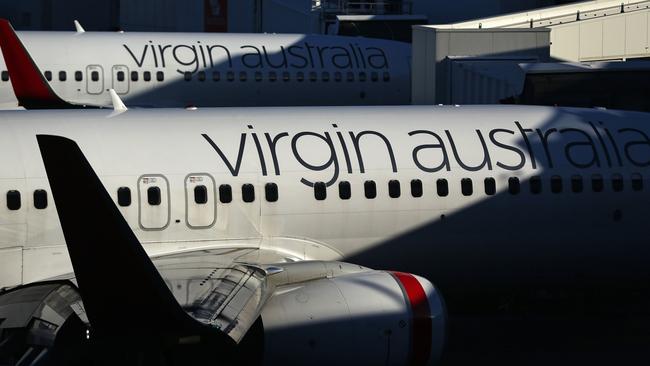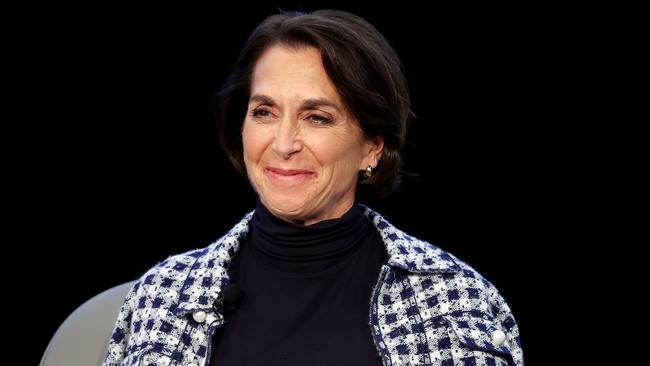Bain Capital hits go on IPO process for Virgin Australia
The private equity group says it will seek advice on the relisting of Virgin Australia in what would be the biggest float on the ASX in years.

Bain Capital says it will seek advice on the relisting of Virgin Australia in what would be the biggest float on the ASX in years.
The US private equity operator acquired the airline out of administration in 2020, at the start of the Covid-19 pandemic, paying $3.5bn for the carrier and Velocity, its frequent flyer program.
Virgin chief executive Jayne Hrdlicka told The Australian in June that the airline had returned to profitability and was considering listing as early as this year.
Mike Murphy, Bain’s Sydney-based partner, said Virgin Australia was in “great shape”. Ms Hrdlicka, he added, had “delivered an impressive transformation since the very challenging phase of Covid and administration”.
“In the coming months we will consider how best to position Virgin Australia for continued growth and long-term prosperity,” he said. “Prior to (the pandemic), Virgin Australia had a proud history as a public company.
“While there is currently no set timetable, at some point in the future, if any IPO does happen, Bain Capital would welcome public market investors joining us as shareholders in what is a great Australian company.”
Virgin Australia was first listed as Virgin Blue in December 2003 with the shares priced at $2.25. When it fell into administration in April 2020 with debts in excess of $7bn, the stock was trading at 8.6c.
Under Bain Capital, Virgin Australia has rebuilt its workforce – which was slashed from 9000 to below 5000 during the pandemic.
Its fleet has grown from 58 aircraft after administration to 92, and from April new Boeing 787-8s will start to arrive. The eight narrow body jets will bring down the average fleet age from 11.2 years, and provide greater network flexibility due to their longer range.
The Velocity program – which Virgin Australia took full control of in 2019 after acquiring a 35 per cent stake owned by Affinity Equity Partners for $700m – has lifted its membership to some 11 million.

Partnership agreements have been signed with United Airlines and Qatar Airways, giving Velocity members greater opportunity to redeem points.
Mr Murphy said Bain Capital had made a long-term commitment to support Virgin Australia’s growth and sustainability.
“It is Bain Capital’s current intention to retain a significant shareholding in a future IPO of Virgin Australia,” he said.
“Bain Capital will ensure these preliminary deliberations are not a distraction for Virgin Australia management who can remain 100 per cent focused on their roles.”
The announcement came as Ms Hrdlicka, 60, was at the Australian Open, in her role as Tennis Australia chair. A keen tennis player herself, Ms Hrdlicka was first elected to the Tennis Australia board in 2016 and was appointed chair the following year.
In December she was re-elected to a third term as chair taking her through to 2025.
The ex-Jetstar chief took the top job at Virgin Australia after it was acquired by Bain Capital. Although there have been reports of clashes with senior staff, leading to an exodus of workers, Ms Hrdlicka has worked with unions to achieve $30m in cuts.
In the wake of Monday’s announcement, Australian Services Union private sector branch secretary Imogen Sturni said workers looked forward to sharing in Virgin’s financial success.
“After agreeing to a wage freeze in 2019 to help get the airline through a challenging time, Virgin staff welcome the announcement from Bain Capital that ‘the business is in great shape’ and look forward to management coming to the bargaining table to negotiate a fair deal and a fair pay rise to meet the rising cost of living,” Ms Sturni said.
“Virgin weathered these turbulent years thanks to the hard work and sacrifices of its staff – it’s time for Virgin management to pay them fairly.”
While it has not landed on an investment bank to provide it with advice in relation to a possible float of Virgin Australia, the private equity group was advised by Goldman Sachs at the time of its acquisition of the airline.
Separately, Morgan Stanley worked with administrators on the sale of Virgin Australia while UBS was the bank that advised Virgin Australia under its former chief executive, Paul Scurrah.
The possible relisting of Virgin Australia comes as the country’s first new major airline in more than 15 years is given the green light to operate flights.
Bonza last Thursday was given clearance to begin services within weeks, the first new carrier since Tiger in 2007. Tiger was later acquired by Virgin Australia before being shut under Bain Capital’s ownership.
Financed by Miami-based 777 Partners, plans for the new airline were first flagged in late 2021 with the intention of becoming operational by mid-2022. But application for CASA approval was only made in April, with the regulator forced to request further information from Bonza several times before signing off on the certification this week.
Virgin Australia posted an underlying loss of $386.7m in the year to June 30 as months of travel restrictions in the first nine months hurt its recovery plans.
The loss were significantly higher than the airline’s 2021 result – an $76.8m underlying loss – and led to speculation that Bain Capital had put off float plans until the performance improved.
But a surge in demand has boosted profits this year. Qantas upgraded its forecasts twice in six weeks, and expects to book a $1.45bn gain for the first half.





